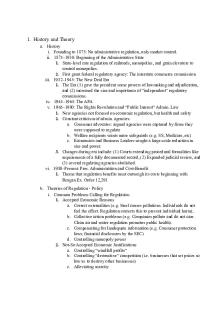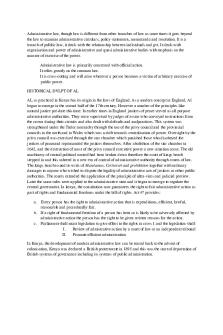tutorial 6 administrative law Multimedia University PDF

| Title | tutorial 6 administrative law Multimedia University |
|---|---|
| Course | Administrative Law |
| Institution | Multimedia University |
| Pages | 3 |
| File Size | 103.1 KB |
| File Type | |
| Total Downloads | 24 |
| Total Views | 73 |
Summary
ADMINISTRATIVE LAW UALTUTORIAL Maru is consulting you on the possible remedies available to an aggrieved party under judicial review. He is unhappy as he feels that some of the public authorities neglected their functions and sometimes exceeding their power in decision making process.Advise Maru.In ...
Description
ADMINISTRATIVE LAW UAL2612 TUTORIAL
1. Maru is consulting you on the possible remedies available to an aggrieved party under judicial review. He is unhappy as he feels that some of the public authorities neglected their functions and sometimes exceeding their power in decision making process. Advise Maru. In general, there are eight remedies that Malaysian courts grant to those who seek judicial review, which are declaration, certiorari, prohibition, mandamus, injunction, qua warranto, habeas corpus and damages. First of all, declaration is a remedy that states (declares) the rights of the affected party. Declaration has no coercive force nor does it quash any decision which may have been taken by admin body. Although such remedy is not enforceable per se, but it can be used with other remedies if successful. It may effectively undermine the enforceability of an administrative act. For example, an order of the Minister which was declared as invalid cannot be enforced legally. A Malaysian case which involves declaration is the case of Mohamad Hassan bin Zakaria v Universiti Teknologi Malaysia. The facts of the case are that the appellant is an Associate Professor of the Language Academy set up under the respondent, one of the public universities in the country. The appellant decided to retire early. He applied to the respondent for the necessary permission. His application was rejected and so were his appeals. The appellant then applied to judicially review the respondent’s decisions by seeking declaratory orders to the effect that the appellant is entitled and has fulfilled the requirements to optionally retire from the service of the respondent; and that the respondent’s rejection of the appellant’s application and appeals are invalid and wrong in law and/or are mala fides. Next is certiorari. The Latin word ‘Certiorare’ means to inform. Certiorari is a decision by the higher Court to hear an appeal from a lower court to quash a decision of a judicial or quasijudicial authority with the intention of restraining any ultra vires exercise of powers. It is also a retrospective order that brings a decision made by the authority before the court and prays that such decision to be quashed. In simpler words, certiorari is used to quash a decision that has already been made. In the case of Re Haji Sazali, it was stated that a certiorari is an order exercise by the High Court in its supervisory jurisdiction over inferior tribunals or public authorities. It includes a magistrate’s order for detention. Generally, a certiorari makes it clear that the decision made earlier need not be followed because it is being quashed as a result of the JR. It is needed after the decision is made, thus the writ has the effect of quashing that decision.
Thirdly, prohibition is an extraordinary prerogative writ of a preventive nature. It is also a prospective order to quash a decision which is going to be made. The writ of Prohibition is issued by the court exercising the power and authorities from continuing the proceedings as basically such authority has no power or jurisdiction to decide the case. Once the action has been carried out then prohibition is too late and certiorari is required. A case which involves prohibition is the case of OSK & Partners Sdn v Tengku Noone Aziz & Anor. In this case the appellant, a stockbroker carrying on business as a member of the Kuala Lumpur Stock Exchange, applied for an order of certiorari to quash the decision of the Committee of the Stock Exchange imposing a fine of RM5,000 on the appellant under art 27 of the articles of association of the Stock Exchange for alleged breaches of the rules of the Exchange consequent to the rejection by the Registrar of Companies as the licensing authority under the Securities Industry Act 1973 of the application for a dealer’s license by one of the shareholders and directors of the appellant. The appellant alleged that the committee did not indicate to it that it had breached the rules in question or give it an opportunity to be heard; and that the committee had erred in law in its construction of the effect and application of the rules. Hashim Yeop A Sani J held that the committee was not a body against whom certiorari will lie on the grounds that (i) the Exchange (and therefore its committee) is essentially a private body; (ii) the relationship between the parties is strictly contractual in nature; (iii) the committee is not under any express or implied duty to act judicially when exercising disciplinary powers and (iv) the functions of the Exchange are not in any way manifestly public in nature as it is no more than an exclusive business club. The effect of a prohibition is that it prevents the tribunal from exceeding its proper jurisdiction, thus normally sought at an earlier stage that is before the authority makes its decision (prevention). Besides that, there is the remedy of mandamus which is directed to private or municipal corporations, or to any of its officers, commanding the performance of a particular actor duty mandated by law. It is enforced to ensure that the public duties are performed by the public authorities. In simpler words, mandamus is used to mandate someone to do something. The case of Mohamad Hassan bin Zakaria v Universiti Teknologi Malaysia also talks about mandamus when the appellant then applied to judicially review the respondent’s decisions by seeking an order of mandamus directing the respondent to approve the appellant’s application for early optional retirement. Other than that, injunction is a judicial order restraining a person from beginning or continuing an action threatening or invading the legal right of another, or compelling a person to carry out a certain act. It is used to mainly to stop the decision from taking effect. There are four types of injunctions which are perpetual injunction, interlocutory injunction, prohibitory injunction and mandatory injunction. Sabil Mulia (M) Sdn Bhd v Pengarah Hospital Tengku Ampuan Rahimah & Ors is a case that involves injunction. In this case, the appellant, a private limited company, carried on the business of a canteen operator at the first respondent's government hospital. The appellant's case was that in reliance of the assurance of the first respondent, the appellant
borrowed money and incurred expenses for the canteen but the first respondent had instead resiled from its assurance by terminating the appellant's contract. The first respondent subsequently granted the contract for operating the canteen to the fourth respondent. The appellant complained that the first respondent acted in breach of contract and constructive trust. The appellant's application for urgent injunction against the first and fourth respondents from evicting it from the canteen premises of the first respondent was dismissed by the judicial commissioner solely on the ground that the court had no jurisdiction to grant the injunction. There were two issues before the court: (1) whether, in view of the provisions of s 29 of the Government Proceedings Act 1956, the High Court had jurisdiction to grant the injunction sought; and (2) whether the facts entitled the appellant to an injunction in the exercise of the court's discretion. Furthermore, Qua Warranto is a writ or legal action requiring a person to show by what warrant an office or franchise is held, claimed, or exercised. It is only needed when someone has taken/usurped the office of another – the order seeks to look for a reason which justifies the taking of such an office. It is issued to restrain the authority or candidate from discharging the functions of public office. A case which involves qua warranto is Lim Cho Hock v Gov of the State of Perak, Menteri Besar, State of Perak and President, Municipality of Ipoh....
Similar Free PDFs

Administrative Law Rhodes University
- 15 Pages

Administrative Law - Admin Law
- 6 Pages

Tutorial 6 land law
- 4 Pages

Administrative Law Outline
- 33 Pages

Administrative Law - Essay
- 5 Pages

Administrative law (4th)
- 59 Pages

Administrative Law Outline / Summary
- 46 Pages

Administrative LAW MERITS REVIEW
- 38 Pages

Administrative Law Outline
- 14 Pages

Administrative Law 70617 - Essay
- 14 Pages

Administrative law Notes Kenya
- 10 Pages

Canadian Administrative Law
- 54 Pages

Administrative LAW I Notes
- 90 Pages
Popular Institutions
- Tinajero National High School - Annex
- Politeknik Caltex Riau
- Yokohama City University
- SGT University
- University of Al-Qadisiyah
- Divine Word College of Vigan
- Techniek College Rotterdam
- Universidade de Santiago
- Universiti Teknologi MARA Cawangan Johor Kampus Pasir Gudang
- Poltekkes Kemenkes Yogyakarta
- Baguio City National High School
- Colegio san marcos
- preparatoria uno
- Centro de Bachillerato Tecnológico Industrial y de Servicios No. 107
- Dalian Maritime University
- Quang Trung Secondary School
- Colegio Tecnológico en Informática
- Corporación Regional de Educación Superior
- Grupo CEDVA
- Dar Al Uloom University
- Centro de Estudios Preuniversitarios de la Universidad Nacional de Ingeniería
- 上智大学
- Aakash International School, Nuna Majara
- San Felipe Neri Catholic School
- Kang Chiao International School - New Taipei City
- Misamis Occidental National High School
- Institución Educativa Escuela Normal Juan Ladrilleros
- Kolehiyo ng Pantukan
- Batanes State College
- Instituto Continental
- Sekolah Menengah Kejuruan Kesehatan Kaltara (Tarakan)
- Colegio de La Inmaculada Concepcion - Cebu


